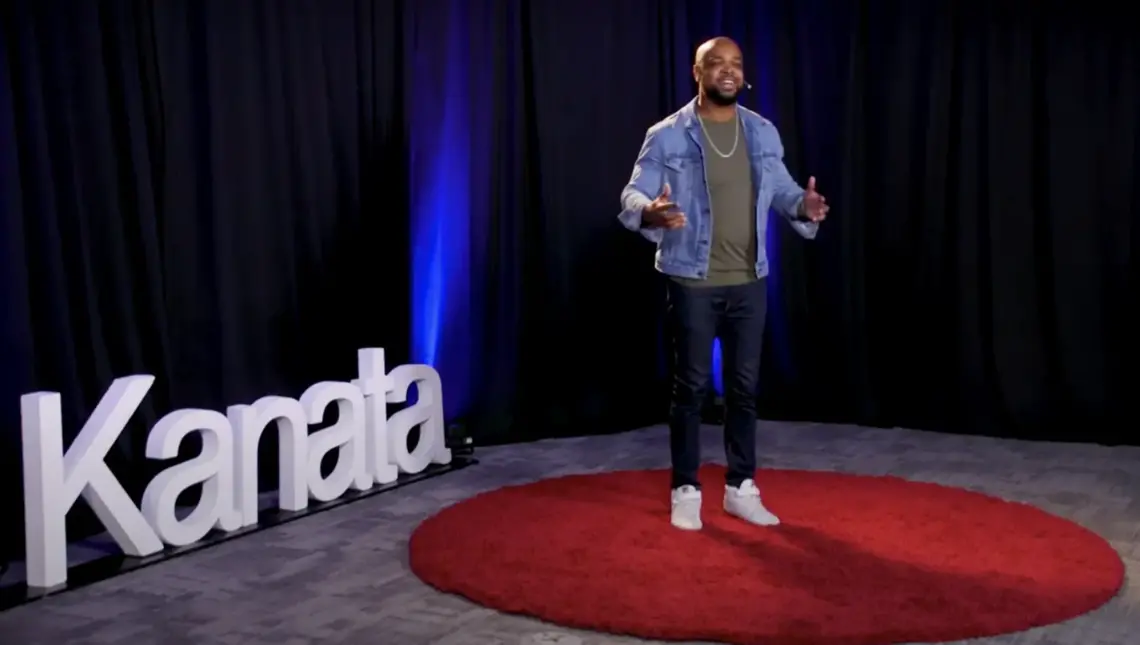
What TedxKanata lacked in in-person programming in 2021, it made up for in meaningful messages delivered by prominent members of the Ottawa business community. From immigration, to dyslexia, to grief, to reimagining post-pandemic life, TedxKanata’s annual event featured an array of perspectives meant to fuel passion, inspiration and adaptation.
The 2021 roster saw 10 presenters speak from the Tedx stage in a series of videos made available on YouTube, sharing perspectives and stories based around this year’s COVID-inspired theme: adapt. Opening the speaker series was Karla Briones, founder of Immigrants Developing Entrepreneurs Academy — an online platform designed to educate immigrants to Canada about – and connect them with – the country’s business ecosystem.
She described her own experience as a Mexican immigrant, having been forced to adapt to “a new stage” in her journey to Canada — using her time as a ballerina as her talk’s most prominent metaphor. “Magic happens when cultures mix,” she said, urging Canadians and mentors to provide immigrant entrepreneurs opportunities to nurture their unique knowledge and skill sets so that they may continue to radically transform the Canadian economy.
“Immigrants — my goodness, we’ve taken the biggest risk of our lives by leaving everything behind and starting over in a new country,” said Briones. “Therefore, newcomers are entrepreneurs by nature, and our adaptability is rooted in one of the most primal instincts: survival.”
“So, ask an immigrant to dance.”
Andrew Reeves, founder of the Ottawa, Toronto and Montreal-based architecture firm Linebox Studio, shared his perspectives on dyslexia — something he has spent his entire life adapting to, though wasn’t formally diagnosed with until he was 42. Dyslexia, he said, is not simply a disability. Instead, continued Reeves, it is a gift that allows him to think differently than everyone else — not better and not worse, “just differently” — crediting the condition for helping him succeed as an architect. He said this “out-of-the-box” thinking has been especially useful amid the pandemic, which has completely transformed how architects must think about the spaces and places people eat, sleep, work, and socialize.
“I knew where I was going to go, and I accepted that there were going to be these things along the way that I needed to overcome — that I needed to work harder, that I needed to do better,” said Reeves. “For me, that’s adapting always and forever.”
Margaret Dennis, founder of EVOLV coaching, a coaching company aimed at uplifting and supporting female entrepreneurs and leaders also spoke at TedxKanata 2021. Her talk followed the chronology of her experience with losing her son, Isaac. After years of struggling with infertility, Isaac passed away at just three days of age. Instead of taking the time to process her grief, Dennis tucked it away and focused on raising her daughter, Lily — Isaac’s twin sister — who lived on to work through her brother’s death in what Dennis described as a fiercely honest, open way.
“I call it ‘Lily’s way,’” she said. “She has grown with grief, and is full of compassion and empathy towards others.” It was her daughter who taught Dennis that pretending to be alright was doing her more bad than good, and though many may have viewed it as socially unacceptable, sharing her grief with others — adapting how she experienced it — was instrumental in her healing process.
“‘After grief’ didn’t mean that I stopped being sad,” she said. “It meant that I learned how to live with the sadness.”
Closing the series, CEO of PR and content marketing firm Shifting Agency Inc. Kevin Bourne spoke about numerous instances of “rebuilding” in his life: rebuilding his career after losing a job on Parliament Hill, rebuilding his well-being after experienced paternal postpartum depression, and rebuilding his business after facing financial straits — all of which he described as “blessings in disguise” and opportunities to let go of the old hopes to embrace new successes and experiences.
His talk also centred around the distinction between rebuilding and retooling, especially as we slowly progress towards a post-COVID world. “In this time, some of us will have the luxury of simply just tinkering with our lives and rebounding,” he said, describing the process of retooling. “Some of us will require drastically restarting all over again,” he said, referring to rebuilding. However, only by being “all in” can individuals adapt enough to take advantage of the opportunities retooling and rebuilding can provide.
When facing something that might force you to adapt, “you’re like a ship, about to go on an amazing, amazing journey,” he said.
“So, I’ll leave you with a final question: are your anchors up, or are they down?”
